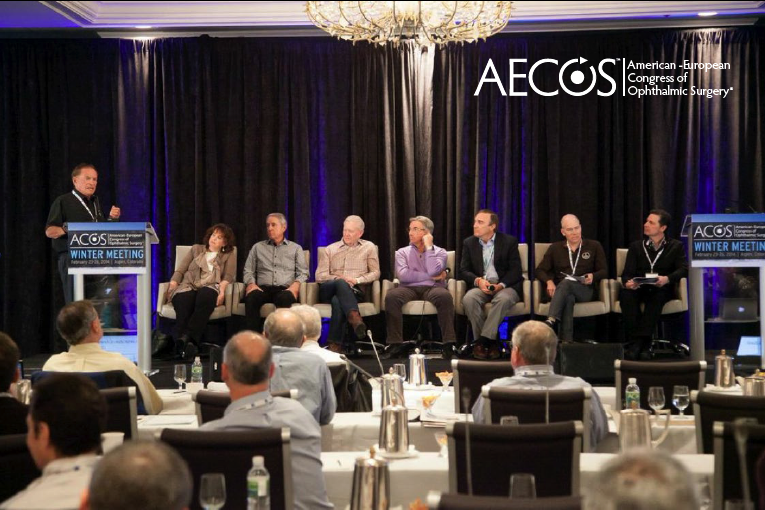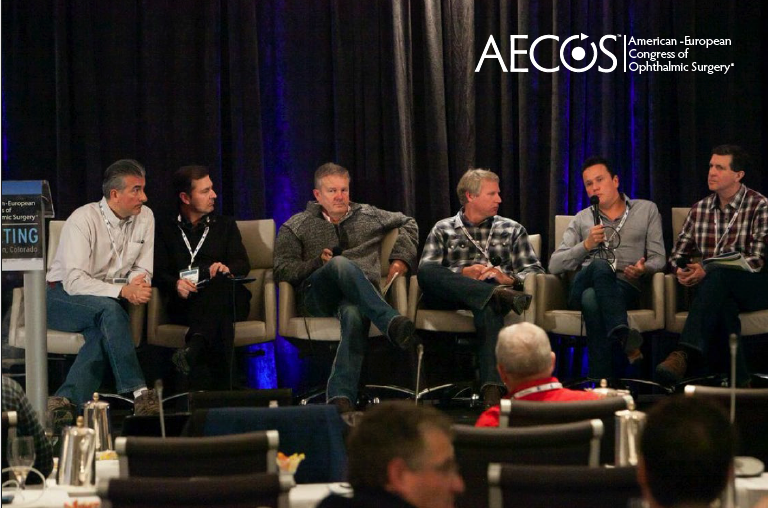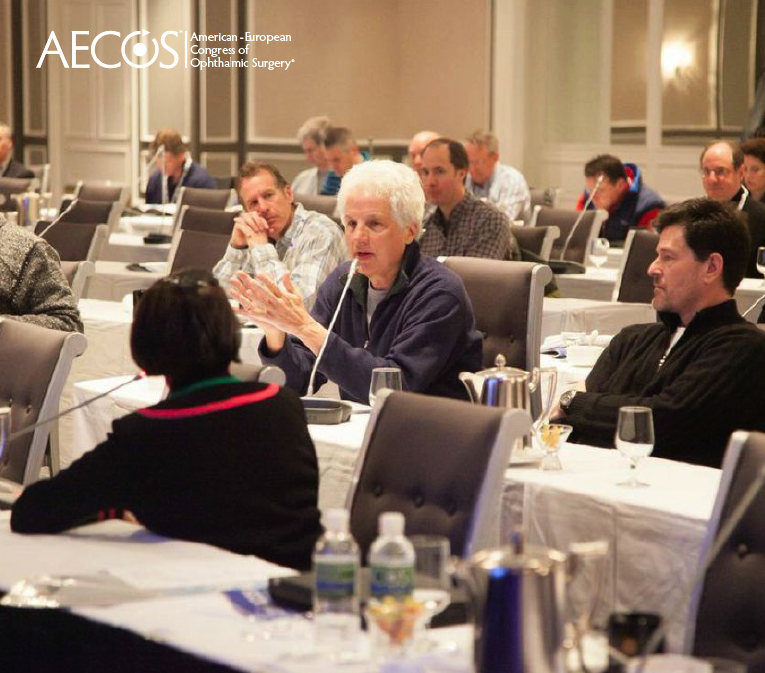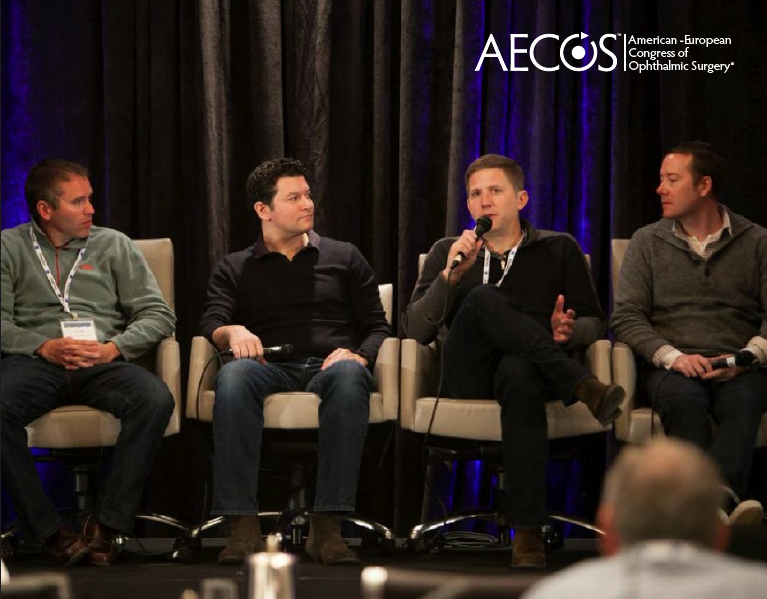The American-European Congress of Ophthalmic Surgery (AECOS) is unique in that it is the only society chartered to foster collaboration and communication between physicians, industry, technology entrepreneurs, and ophthalmic investors. Both physicians and industry leaders serve on the AECOS board, where all have an equal voice in making decisions for our organization. In fact, the mission of AECOS is to embrace this collaboration between industry and physicians to ultimately provide better care for our patients.
In some situations today, physicians almost feel the need to apologize for working with industry because we are constantly asked to disclose our relationships. At AECOS, however, our perspective is that every single technology that has ever been brought to human use has involved a collaboration of physicians and industry, so we embrace that association. For both physicians and industry, AECOS represents a safe and neutral way for us to interact with one another in a very positive fashion.
In a typical meeting environment, say the AAO, industry is almost relegated to a position of trying to sell things to physicians. There are exhibit halls and scientific symposia and a very clear delineation between the two. Members of industry typically do not attend the scientific sessions, and when physicians are in the exhibit hall, we are, in some cases, a target for the marketing arm of industry. In contrast, AECOS represents a casual, mutual ground where we can discuss how to help one another, and it has been extraordinarily effective.
WORKING WITH THE FDA
One major differentiator between AECOS and other professional societies is that physicians and industry leaders in AECOS have actually worked together to try to shepherd technology through the FDA. As far as I am aware, AECOS is the first and only ophthalmic professional society to launch and sponsor an FDA clinical trial, and that is our corneal collagen crosslinking study. This trial has been extremely successful, with close to 100 sites, and we are looking to start a second FDA clinical trial in crosslinking as well.
AECOS’ collaboration with the FDA has not been limited to clinical trials. AECOS is also an active member of the FDA/CDRH Network of Experts. This panel creates a pool of verified experts to whom the FDA may refer when evaluating technologies or responding to product challenges. We are honored to be included in this network, which validates AECOS as an organization of physicians who could serve the FDA as expert advisors on ophthalmic technologies, and this has been quite valuable to our membership.
INNOVATION ABROAD
AECOS is not just a US organization; it is also a European organization in that there is now a European branch of AECOS with its own executive committee and reciprocity in terms of membership. US members can attend European meetings and vice versa. Because the current regulatory climate dictates that a great deal of innovation occurs in Europe, it is very helpful for physicians to stay informed of advances abroad, particularly younger ophthalmologists who want to get involved in developing startup technologies and bringing new devices to the United States.
ESTABLISHING RELATIONSHIPS
For a younger physician who is interested in working with industry as a consultant or in becoming a key opinion leader, I can think of no better vehicle to establish those relationships than becoming a member of AECOS. However, membership is not automatic. Unlike most professional societies, there is an application process for AECOS. Just as members of industry have to show that they have made a significant contribution to the field, ophthalmologists who join AECOS must demonstrate a significant level of contribution in a quantifiable fashion, such as the number of papers published, lectures given at major meetings, or book chapters written, etc. We have objective, identifiable criteria so that physicians can determine whether they meet those requirements. Certainly not all physicians who apply are accepted, but for those who are, the honor of being recognized by your peers is one of the most gratifying forms of recognition that any of us could ever receive.
In ophthalmology, there is no question that industry leaders have a tendency to remain in our field, even if they leave a particular company. Because ophthalmology is such a self-contained microcosm, we tend to know members of industry who may be on their second or third company; however, the relationships that they developed transcend their tenure with a specific corporation. When those industry leaders start new companies or find themselves in new roles at new companies, they tend to look to the same group of physicians who they trust and who they know can be researchers, innovators, and product champions.
It is helpful to recognize that we now have a climate in ophthalmology in which a lot of acquisitions are occurring. And when acquisitions occur, there tend to be layoffs. However, out of those acquisitions, many talented people land on their feet with time on their hands; those individuals who were previously developing products for larger companies may start smaller companies, which are truly the genesis of innovation in ophthalmology and in all specialties. It is a bit like a supernova exploding—one of the big companies blows up, but thousands of smaller opportunities for innovation arise out of that chaos. We may be seeing that happening right now with Allergan and Valeant. Regardless, within this changing environment, it is possible for the relationships formed between physicians and industry to endure and remain productive.
MEETING ATTENDANCE
If I were a young physician who could attend only two meetings a year, I would make one a large meeting, such as AAO or ASCRS, and the second, a smaller, more participatory meeting. I can’t think of a better opportunity than a meeting like AECOS, where interactive discussion is encouraged with some of the finest minds in ophthalmology—from both physician and industry standpoints—in an open, comprehensive program focused on innovations in anterior segment surgery. Membership is not a requirement for attending an AECOS meeting, and the quality of relationships formed at these meetings is unprecedented. I have heard time and again from seasoned ophthalmologists with extensive industry contacts that they get more out of AECOS meetings than any other meeting they attend all year, anywhere in the world; that has become such a familiar refrain, and I can’t imagine a better scenario for a young physician trying to break into a position of leadership in ophthalmology.


The AECOS meetings serve as an intimate forum for communication among physicians, members of industry, and regulatory experts. From left to right: Herbert Kaufman, MD; Judy Gordon; Randy Alexander; Bill Link, PhD; James Mazzo; Cal Roberts, MD; Robert Maloney, MD; and Arthur Cummings, MB ChB, FCS(SA), MMed(Ophth), FRCS(Edin).

The AECOS meetings also feature both US and European perspectives on regulation, surgical techniques, advanced technologies, and more. From left to right: A. John Kanellopoulos, MD; Arthur Cummings, MB ChB, FCS(SA), MMed(Ophth), FRCS(Edin); Matthias Maus, MD; Mark Kontos, MD; Erik Mertens, MD; and John Vukich, MD.

AECOS attendees take advantage of the smaller meeting size by communicating directly with one another about issues relevant to physicians and industry.

On the Young Ophthalmologists Panel, held at AECOS Aspen, John Berdahl, MD; Christopher Starr, MD; William Wiley, MD; and George Waring IV, MD, fielded questions about starting out in practice, the future of ophthalmology, and the desire to innovate among their generation.
Sidebar
Physicians Support Allergan’s Rejection of Unsolicited Acquisition Proposal
Callan Navitsky, Editor-in-Chief
In recent months, Allergan’s Board of Directors has twice rejected an unsolicited acquisition proposal as well as an exchange offer from Valeant Pharmaceuticals and Pershing Square Capital Management. Acquisitions are not uncommon in ophthalmology; however, a unique aspect of this scenario is the volume of outspoken support Allergan has received from physicians regarding its rejection of this proposal—an outcome indicative of the relationships that physicians and industry have in this field.
Following the Allergan Board’s unanimous rejection of Valeant’s unsolicited proposal, the company reportedly received more than 500 letters from physician customers, patient advocacy groups, and medical associations. In these letters, members of the health care community voiced their appreciation for Allergan’s contributions to the fields of research and development, product innovation, market creation, and physician support and services.
As indicated by the articles in this MillennialEYECover Focus and these letters in support of Allergan, physician-industry collaboration is of immense value to the ophthalmic community. Clearly, members from both parties recognize that these relationships are essential to achieving the greater goal of advancing patient care and are therefore worth cultivating and, if necessary, defending. Below are some of the words expressed by ophthalmologists worldwide in defense of Allergan’s commitment to physicians, innovation, and collaboration.
Testimonials
"[Allergan] has had not only a sustained commitment to shareholder value as a public company, but it has had an equally sustained—and successful—commitment to advancing health care through innovative, focused research, and product development ... This has not occurred serendipitously. It has resulted from leadership’s in-depth understanding of health care challenges, research opportunities, and focused execution with an eye towards both financial and public health value."
–David W. Parke II, MD
"The importance of the physician-corporate partnership as a means for fostering innovation and advancement in ophthalmology cannot be overstated, and ASCRS and its physician membership have long relied on the progressive thinking and support of companies like Allergan in our ongoing mission to enhance patient care and improve lives."
–Richard A. Lewis, MD
"As President of the Italian Ophthalmological Society I would like ... to thank Allergan for the continuous support to benefit patient care ... It is evident that you and the Company well understand eye doctors needs, and I sincerely appreciate your untiring efforts to assure a positive service to us and to our patients."
–Matteo Piovella, MD
"I was pleased to learn in the news today that Allergan has rejected Valeant’s unsolicited proposal … As it stands today, Allergan has a proven track record of innovation through research and development that has resulted in many valuable therapeutic options."
–Nathan Radcliffe, MD
"... your support of education has directly benefited every ophthalmologist in our country and organizations such as the American Society of Cataract and Refractive Surgery could not exist without your assistance."
–Eric Donnenfeld, MD

